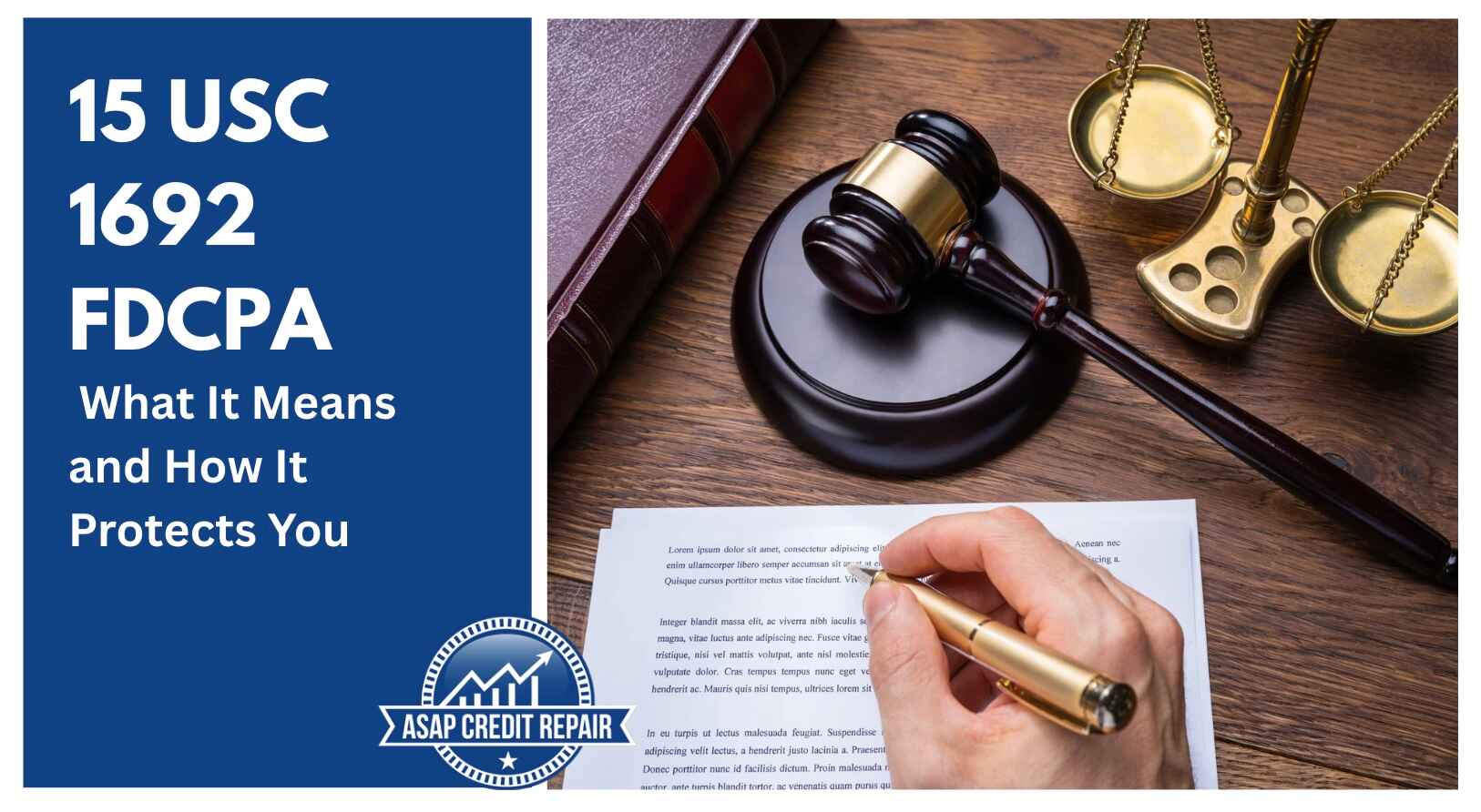Dealing with debt collectors is stressful enough without worrying about harassment or illegal tactics. The constant phone calls and threatening letters can make an already difficult situation unbearable. Understanding your federal rights under the FDCPA empowers you to fight back and protect yourself.
What is 15 USC 1692 (The Fair Debt Collection Practices Act)?
The Fair Debt Collection Practices Act (FDCPA), formally codified as 15 United States Code Section 1692, is a comprehensive federal consumer protection law enacted in 1977 to regulate debt collection practices.
"The FDCPA was created because Congress found that 'abusive debt collection practices contribute to the number of personal bankruptcies, to marital instability, to the loss of jobs, and to invasions of individual privacy.'" - Congressional Findings
Primary Enforcement Agencies:
- Consumer Financial Protection Bureau (CFPB): consumerfinance.gov
- Federal Trade Commission (FTC): ftc.gov
Who Must Follow FDCPA Rules
Understanding who must follow FDCPA rules is crucial for knowing when your rights apply.
Covered by FDCPA:
- Third-party collection agencies
- Debt buyers who purchase defaulted accounts
- Law firms collecting debts for clients
- Anyone whose principal business is debt collection
NOT Covered by FDCPA:
- Original creditors collecting their own debts
- Banks collecting their own loans
- Government agencies collecting taxes
Key FDCPA Protections
Communication Restrictions
Time and Location Limits:
- No contact before 8:00 AM or after 9:00 PM
- Cannot contact you at work if prohibited
- Cannot discuss your debt with family, friends, or neighbors
- Cannot contact you at inconvenient times or places
Harassment Prohibitions
Debt collectors cannot:
- Threaten violence or harm to person or property
- Use obscene, profane, or abusive language
- Call repeatedly to annoy you
- Make anonymous calls
- Publish lists of consumers who refuse to pay
Debt Validation Rights
One of the most powerful FDCPA protections is your right to debt validation under 15 USC 1692g.
Your Validation Rights:
- Must receive written notice within 5 days of first contact
- 30 days to request validation after receiving notice
- Collection activities must stop during validation period
- Collector must prove they own the debt and amount is accurate
What Proper Validation Must Include:
- Account statements or payment history
- Original signed credit agreement
- Chain of title showing legal ownership
- Proof of collector's authority to collect
"Approximately 80% of debt validation requests result in either debt dismissal or significant balance reductions due to inadequate collector documentation." - ASAP Credit Repair data
Prohibited False Statements
Collectors cannot make false claims about:
- The legal status of your debt
- Being attorneys or government representatives
- Threatening legal action they won't take
- The amount or nature of the debt
- Using fake company names or legal letterhead
How to Exercise Your FDCPA Rights
Step-by-Step Validation Process
Phase 1: Initial Response (Within 30 days)
- Send written validation request via certified mail
- Dispute the debt in writing
- Request written-only communication
- Document everything with copies and receipts
Phase 2: During Validation Period
- Collection activity must stop completely
- No calls, letters, or credit reporting allowed
- Collector must provide adequate documentation
- Burden of proof is on the collector
Sample Validation Request: "I am requesting validation of this alleged debt as required under 15 USC 1692g. Please provide documentation showing: (1) that you own this debt, (2) that I am legally obligated to pay, and (3) the accurate amount including complete payment history. I dispute this debt and request cessation of collection activities until proper validation is provided."
Filing Complaints and Taking Action
Government Complaint Options:
- CFPB: Online portal at consumerfinance.gov
- FTC: Consumer Sentinel complaint system
- State Attorney General: Additional state-level protections
Legal Remedies Under 15 USC 1692k:
- Actual damages for financial losses and emotional distress
- Statutory damages up to $1,000 per violation
- Attorney fees for winning cases
- Class action potential up to $500,000
"FDCPA lawsuits result in average settlements of $3,000-$15,000 for individual cases." - National Association of Consumer Advocates
Taking Action Under FDCPA
Your Immediate Action Plan:
Phase 1: Document and Respond
- Review all communications for potential violations
- Send debt validation requests within 30 days
- Document everything with detailed records
- Contact ASAP Credit Repair for professional evaluation
Phase 2: Strategic Enforcement
- File government complaints for serious violations
- Evaluate legal action potential
- Negotiate using violations as leverage
- Secure debt resolution and credit removal agreements
Red Flags Requiring Immediate Help:
- Threats of arrest or criminal prosecution
- Contact with your employer about the debt
- Harassment of family members
- False legal documents
- Abusive language or threats of violence

